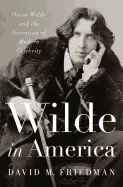
Wilde in America - by David M. Friedman
ISBN: 0393063178Date read: 2015-09-20
How strongly I recommend it: 2/10
(See my list of 360+ books, for more.)
Go to the Amazon page for details and reviews.
A fine biography of Oscar Wilde's unique approach to America. Best quote: “Other Europeans came to learn about America; Wilde came so America could learn about him.”
my notes
Celebrity, a word that once referred exclusively to persons of achievement, has expanded its meaning to include persons famous merely for being famous, a status won by manipulating the media. It is a worldview where fame isn’t the end product of a career but the beginning of one.
Other Europeans came to learn about America; Wilde came so America could learn about him.
The line between fame and notoriety could be blurry. Maybe even nonexistent.
In the Victorian world Wilde was born in, fame accrued from one’s deeds, notoriety from one’s persona. The former was bestowed by others as a response to real-world accomplishments. The latter was usually accomplished by oneself, using an identity—or pose—created in one’s imagination.
Flashy new category incorporating the best and worst of notoriety and fame. This is the status we now call celebrity.
“Epigrams are always better than argument in conversation,” she said. And “paradox is the very essence of social wit.”
Identity is a kind of fiction, and that being oneself is a form of playacting.
Appearances have their own reality.
The most important act of creativity is the creation of one’s image.
It was not enough to stand up; one had to stand out.
The true master of conversation, is the one who leavens seriousness with humor.
Details are the enemy of good talk.
The goal of any good conversationalist “is not to instruct but to divert, and to ask him, ‘Is that really true?’
He perfected a verbal trick: replacing a word in a sentence with its unexpected opposite. This sleight of tongue enabled him to take subjects that others deemed serious and treat them irreverently, or take matters that others thought trivial and treat them with great solemnity—producing amusement either way.
“I can resist everything except temptation.”
“If one tells the truth, one is sure, sooner or later, to be found out.”
“Don’t be led astray down the path of virtue.”
“Only shallow people do not judge by appearances.”
“I can sympathize with everything except suffering.”
“True friends stab you in the front.”
To make his photos more than portraits, which is to say, more than just images presenting an interesting face. He would make them pictures. The difference, he had learned from John Ruskin at Oxford, was that pictures tell a story. (Wilde’s belief in that distinction explains why he later chose the title The Picture of Dorian Gray for his only novel, rather than The Portrait of Dorian Gray.)
Celebrity is contagious. Wilde planned to absorb the star power of as many American luminaries as he could while touring the States,